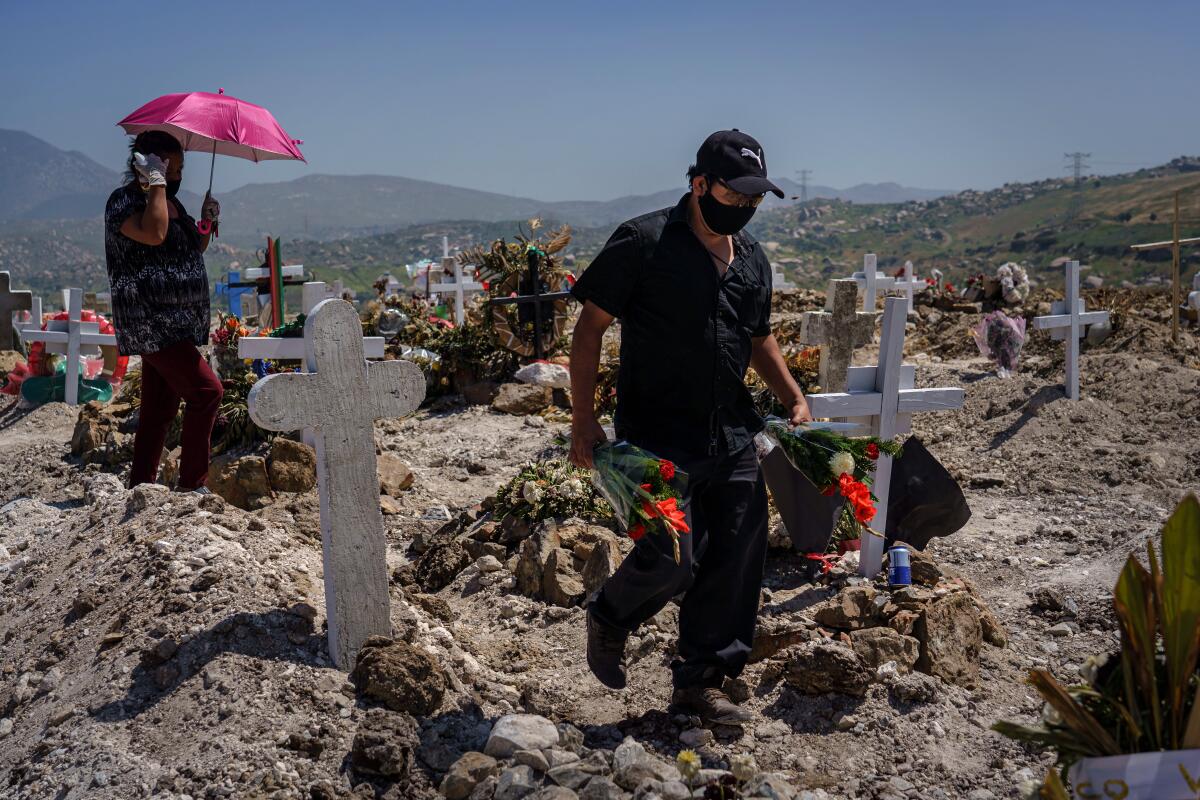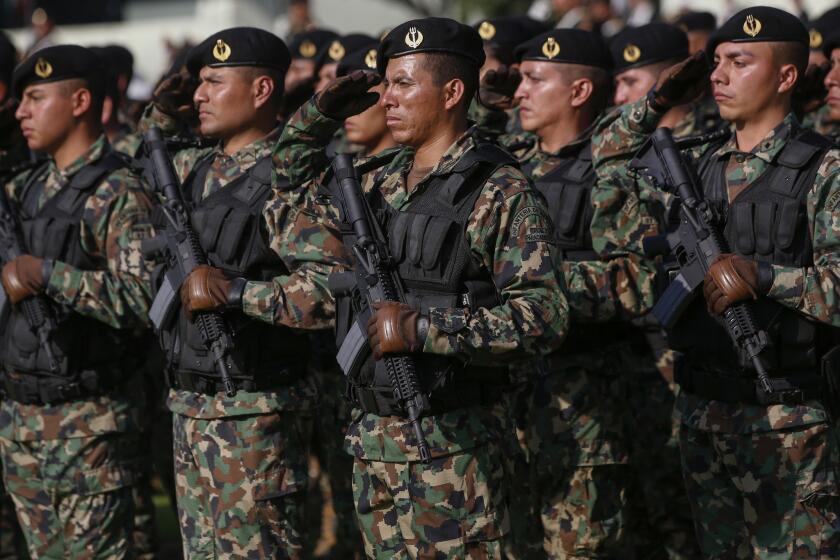Mexico crosses grim coronavirus milestones: 100,000 dead, 1 million infections

- Share via
MEXICO CITY — It was time for a break, Marisela Pérez decided, a chance to ditch concerns about masks and social distancing and the pervasive fear of infection. She and her husband gathered up the couple’s two children, aged 10 and 6, and drove last weekend to Acapulco.
“My kids are stuck at home all day, doing their classes online, never getting out, ” said Pérez, 37, a cosmetics saleswoman. “I see them angry, full of anxiety. How is that possible? They are only kids! So we took them to the beach. I haven’t seen them this happy in months.”
On Thursday, Mexico passed a doleful milestone: The country’s pandemic death toll topped 100,000. Only the United States, Brazil and India have more.
Five days earlier, Mexico recorded infection number 1 million. Mexico ranks 11th on the global infection list, according to data from Johns Hopkins University.
But the true number of deaths here is considerably higher, officials concede, because Mexico lags well behind most other countries in testing. Many virus-related fatalities have been attributed to other causes, health authorities say.
There were no memorial ceremonies to mark the latest metrics of calamity. Rather, surging case numbers and shrinking hospital bed space have forced new restrictions for restaurants, shopping centers, gyms and other venues in Mexico City and elsewhere.
The U.S. decision to drop drug trafficking charges against Gen. Salvador Cienfuegos shines a light on Mexico’s increasingly powerful military.
The 100,000 marker spurred a renewed wave of criticism against a president whose government has eschewed mandatory lockdowns and curfews, stressed voluntary compliance with mask-wearing and social distancing guidelines, and discounted virus testing and contact tracing.
Headlines highlighted the official “failure” in a nation where, as in the United States, the pandemic has become thoroughly politicized.
In response, President Andrés Manuel López Obrador, a left-wing populist, assailed conservative “vultures” for partisan weaponizing of a catastrophe.
“From the beginning, they wanted to use the misfortune of the Mexican people in this pandemic to blame us,” the president said. “It’s obvious.”
Past governments, he noted, had left a hollowed-out health network, short on hospitals, equipment and physicians. The system had to be rebuilt on the fly, he said, as the pandemic swept across Mexico. Still, he asserted, the country’s emergency response had “yielded results,” noting that Mexico’s known death rate of 79 persons per 100,000 persons places the country 10th on the global list, according to Johns Hopkins figures. Belgium is first with a death rate of 133 per 100,000. Peru tops the Americas with 110 deaths per 100,000. The United States ranks 13th with 77 deaths per 100,000.
Regardless of the numbers, Mexicans continue to get sick and die, and cases are spiking again. People fret not only about their physical health, but also their psychological well-being — and that of their children. In-school learning has been shut down since the spring.
A modified stay-at-home order goes into effect for the much of California as of Saturday morning to try to slow the rapid spread of the coronavirus.
“Of course the coronavirus scares me, but I’m also concerned about the mental health of my kids — no school, not being able to see their friends, missing recreational activities,” said Pérez, the mother of two who decamped to Acapulco last weekend with her family. “This pandemic changed everything.”
Here, as in much of the world, people have adapted, endeavoring to return to a semblance of quotidian existence. In a country where almost half the population lives in poverty, they see a desperate need to get back to work, despite a cratering economy. Traffic in the capital is almost back to its pre-pandemic, frenzied pace. Commuters jam into trains and buses. Shopping centers are teeming. It all looks normal, except for the legions of mask-wearers.
“It’s kind of crazy,” said Rosa Isabel Márquez, 41, a lawyer who was trolling for bargains in a crowded mall in the capital’s upscale Santa Fe district. “Forget social distancing! The lines at the cash registers are too long. Everyone is thrown together.”
Daniela Montesinos had been ruminating for a long time about her 50th birthday. She wanted a big bash, with 100 relatives and friends. But pandemic rules restrict gatherings to 50 or fewer. She managed to persuade a hall owner to allow 60 partiers at the Nov. 7 blowout.
“We had a great time—mariachis, tacos, drinks,” recalled Montesinos, a school secretary. “I know it is the time of coronavirus, but we need some diversion too. … If we don’t die of the coronavirus, we will all die of depression!”
Throughout Mexico, officials have identified birthday parties, weddings and other fiestas as virus super-spreaders. Video of police dispersing sundry shindigs, to the distress of revelers hoisting cups of good cheer, has aired on TV and social media.
A system of pooled coronavirus tests to catch asymptomatic infections among Duke University students helped keep the campus open in the midst of the pandemic.
Rosa María Sánchez has not been in a festive frame of mind.
Her husband, José González, 65, a gardener, was always healthy, she said, lacking vices except for smoking two or three cigarettes a day. But he came down with a fever and cough on a Tuesday in September. The family waited until the following Saturday to take him to a hospital — a not unusual precaution in a country where the parlous state of medical care leaves many viewing hospitals as places where people go to die. He was put on a respirator and succumbed two days later, one more statistic on the coronavirus mortality ledger.
He passed alone. “I couldn’t be there when he most needed me,” she lamented.
Sánchez, 64, now stays home most of the time. Her children do the shopping. On the TV, Sánchez sees accounts of people going to parties and bars. She is aghast.
“I would tell these people: ‘Stay home! Use a mask when you go out!’ Because when one loses a loved one there is immeasurable grief. I know. Take care of yourself now. Before it’s too late.”
Sánchez is a special correspondent.
More to Read
Sign up for Essential California
The most important California stories and recommendations in your inbox every morning.
You may occasionally receive promotional content from the Los Angeles Times.













